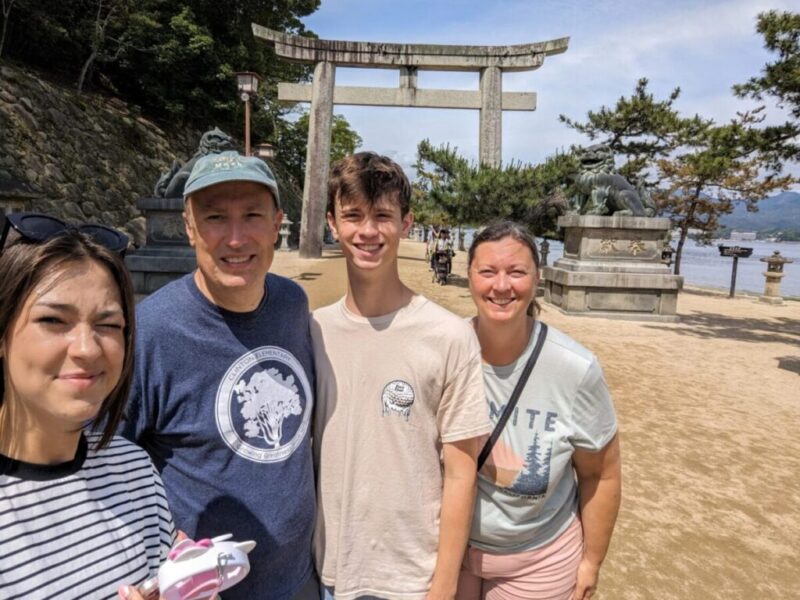Hey there! Planning a dream trip across the ocean? Have you planned for jet lag???
You may feel jet lag when you travel across two or more time zones. I don't notice it much when we fly across the United States. But when we fly across an ocean I definitely feel it.
My family traveled to Japan in June 2023 and Austria in December 2023. Both those trips were AMAZING, but jet lag was part of the package.
Japan and Austria are eight time zones from my Utah home in opposite directions. Since Daylight Savings Time messes me up for a week, imagine how much I felt the time difference on those trips…
Jet lag stinks. But it shouldn't wreck your trip. And if you know it's coming, you can plan around it and make it better.

What is jet lag?
Jet lag is the physical effect on your body when the time zone you are in doesn't match the time zone you are used to. You may feel jet lag when you travel across two or more time zones.
Symptoms include both tiredness and insomnia since your body may want to sleep during the daytime and not sleep at night. Other symptoms may include headache, nausea, lack of focus, irritability, and just not feeling quite right.
Symptoms are temporary and should disappear within a couple of days to a couple of weeks. Age, health, and other factors contribute to how much you may feel jet lag.
My two teenagers don't feel jet lag as much as I do. In both Japan and Austria, they were sleeping normally within 2-3 nights. I adjusted to the new time zone just in time to fly home and deal with the jet lag all over again.
6 Tips for Dealing with Jet Lag
This is what works for me, plus a bonus tip from the CDC, Cleveland Clinic, and Washington Post that I may try before our next flight.
Book Comfortable Lodging
I learned this lesson in Japan where we booked two hotels for the first week of our trip, and then a capsule hotel and a traditional ryokan for the second week. At the hotels, we booked two rooms so my family of four would have plenty of space.
The capsule hotel and the ryokan – where we slept on futons on the floor – were fun and uniquely Japanese experiences. But for me and my husband, they weren't comfortable. The pad in the capsule and the futon at the ryokan just weren't soft or thick enough. It didn't bother my teens. But I didn't sleep well the first week because of jet lag and I didn't sleep well the second week because of uncomfortable beds.
I still enjoyed everything we saw and did in Japan but felt sleep-deprived during the whole trip. I came home feeling sick and exhausted. Japan is 100% worth it, but in my memories of that trip, I filter that part out…
When I booked our Austria hotels a few months later, comfortable lodging was a priority. I made sure to book hotels with enough space for four teens and adults to sleep comfortably. We booked two rooms in Munich and Salzburg and a 2-bedroom suite in Vienna.
Sleeping in an unfamiliar bed is never perfect, but I slept better in Austria. And that made the whole trip better.
Related: Why You Should Splurge on Lodging
Ease In
Avoid scheduling important activities on your first days of your vacation or your first few days at home. Downtime after the trip is more important for me because the excitement of being on a long-awaited trip balances sluggishness from jet lag.
After Japan and Austria, it took me a couple of weeks to feel well-rested again because I was exhausted from a high-energy trip AND feeling jet lag. Schedule a day or two “vacation from your vacation” when you get home, if possible. Giving myself time to recover after the trip is the strategy that helps me the MOST.
Related: The #1Rule for Planning Your Trip Itinerary

Use Jet Lag to Your Advantage
If you are traveling east, you will probably feel awake and alert early in the morning. If you are traveling west, you will probably have more energy in the evening.
Plan activities in the first few days of your trip that work well with how you will probably feel.
Before our trip to Japan, we read several recommendations to visit the Toyosu or Tsukiji fish markets early in the trip because it's an early morning activity and visitors from the U.S. will probably be awake anyway.
It was true. We were all wide awake at 5 AM on our first morning and it was a great time to visit the market. And we had no problem arriving early at Tokyo Disney Resort the next two mornings. But we didn't have staying power for fireworks at the end of the day.
On the other hand, if you are flying from the U.S. to Europe, consider scheduling afternoon or evening shows, tours, and dinners and avoid big early morning activities for your first days of the trip
Related: 5 Tips for Planning Vacation Activities
Healthy Habits
In my opinion, good hydration, nutrition, exercise, and sleep are the first answers to most health problems.
Every source I've read about managing jet lag specifically recommends drinking plenty of water and avoiding alcohol. Caffeinated drinks are OK during the day to give you a little fake pep, but avoid them at night.
Good nutrition is always a good idea. Quality fuel helps me function better when I am tired. It can also help your immune system fight any bugs you may pick up in your travels. Eating smaller meals can help if jet lag upsets your stomach.
Physical activity during the day can encourage good sleep at night. We typically walked 15,000-20,000 steps per day on our trips to Japan and Austria. Exercise was no problem.
We are big believers in bedtime routines and good sleep hygiene at my house. Even when I have trouble sleeping due to jet lag, my usual bedtime routine helps my body get ready to rest. I turn off screens and read a book after I wash my face and brush my teeth.
Maintain bedtime and nap routines for kids as much as possible when you travel. Chances are, they will adjust faster to the new time zone than you do.
When I am not sleeping at night due to jet lag, I do my best not to worry about it. It's a temporary situation and my body will sleep through the night when it needs to. We arrived in Munich after about 36 hours without sleep. I slept all night on our first night in Europe. Insomnia was more of a problem on the following few nights.
Over-the-Counter Help
Your doctor or pharmacist can recommend supplements and medications that can help you sleep through jet lag. Melatonin is popular. I've tried it but didn't notice much difference. But it may help you sleep if you take it at the beginning of your bedtime routine.
Lavender essential oil is part of my usual bedtime routine, so I travel with it to encourage relaxation and sleep.
I don't like how over-the-counter sleep aids like Tylenol PM or zzzQuil make me feel the next morning, but I use them when we travel, as needed. After a few nights of not sleeping well, these OTC drugs generally help me get a full night's sleep.
BONUS: Adjust your Routine in Advance
Start going to bed earlier (going east) or staying up later (going west) before you leave on the trip. This is recommended by every source I read.
Whether or not it's practical for busy families with work and school schedules to adjust to your new time zone in advance is a different story. But I may try this before my next trip – especially if it's only a couple of time zones.
If you can schedule your flight during the daytime or get a seat that helps you sleep better on the plane, it's a good idea. Do what you can to get a full night's sleep on the night before your trip.

Conclusion
Unfortunately, jet lag is unavoidable for most people who travel across several time zones. But the good news is that it is temporary and it probably won't wreck your trip.
Plan for jet lag and give yourself some grace while you adjust to a different time zone. Understand that some members of your family may feel it more than others.
Travel is full of ups and downs and jet lag is a trade I'm happy to make for a new adventure to another part of the world. How about you?
Do you have tips for managing jet lag? Please share in the Comments section.
Happy travels!













Mukund Deshmukh
Thank you for this insightful post! Your practical tips for combating jet lag are incredibly helpful. I particularly appreciate the advice on gradually adjusting sleep schedules before travel and staying hydrated. One thing that has worked well for me is using a sunrise alarm clock to help my body adapt to the new time zone by simulating natural light. It’s fascinating how small changes can make such a significant difference in reducing jet lag symptoms. Looking forward to trying out some of your other suggestions on my next trip!